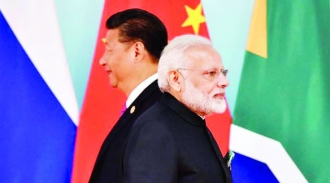An informal meet between Modi and Premier Xi is giving them an opportunity for a face-to-face discussion on various issues to reboot Sino-Indian ties.
The proposed ‘informal’ over-the-table talks between Indian Prime Minister Narendra Modi and Chinese Premier Xi Jinping later this week, months before the much-awaited Shanghai Cooperation Organization summit where the two leaders were otherwise expected to come face-to-face, marks a departure from the routine in Sino-Indian relations and signals the turning of a new chapter in the bilateral relationship. Barring a few meetings on the sidelines of various multilateral fora, this full-fledged meeting or summit holds the promise of great opportunity for the two leaders to address mounting discontent on both sides ever since the prolonged Doklam stand-off. There is no better way of allaying apprehensions and handling a fragile relationship better than doing it in person.
Nevertheless, behind such diplomatic maneuvers are many behind-the-scene developments that led to breaking the deadlock. It is the cumulative work of both External Affairs Minister Sushma Swaraj and her Chinese counterpart Wang Yi both of whom who did a stellar job in laying the groundwork for the visit to fructify. It also needs to be said that increasingly complex global developments have led the two countries to pull back from the brink of continuing animosity and play up the advantages of cooperation. Having understood the consequences of a trade deficit with the US, both Beijing and New Delhi have a vested interest in drawing closer to each other. An expansionist and ambitious China under Xi wants to fulfill the Middle Kingdom’s eternal aspiration of being a Great Power and thus emerge as a countervailing force to the US; to that end, it certainly does not want India in America’s arms. India too has its concerns, most crucial among them being its war against terrorism, for which Chinese support is vital.
However, it will be erroneous for New Delhi to fall for Beijing’s sweet-talk. At the diplomatic level, commitments to settle border disputes, resumption of the Kailash Mansarovar Yatra and an enhanced role for India in the Belt and Road initiative all sound promising. But for Modi and Xi to emerge from the summit with a win-win situation, Beijing needs to crack down hard on its all-weather ally Pakistan and the terror directed against India emanating from its territory. On this front, in a bid to maintain cordial relations with Islamabad, China has incurred New Delhi’s displeasure for failing to act. Beijing’s track record says it all: China has taken it upon itself to shield Pakistan and its terror factories. Time and again it failed to endorse India’s bid to impose a ban on the activities of Masood Azhar and has also consistently been stalling India’s entry into the Nuclear Suppliers Group. This at a time when the China has itself been a victim of terrorism in the Muslim-dominated northwestern province of Xinjiang. As a longstanding victim of jihadi terrorism, India must iterate that Beijing’s support for its counter-terrorism measures is non-negotiable. Depending on how that goes, New Delhi too can show flexibility on China’s long-pending demand to ink the Treaty for Good Neighborly and Friendly Cooperation between the two countries. There can be no better cure to resolve disagreements and cement ties than bilateral talks. But our optimism must be tempered by sober, rational assessments of the pros and cons of dealing with an adversary whom we don’t want as an enemy right now.
Writer: Pioneer
Courtesy: The Pioneer








 OpinionExpress.In
OpinionExpress.In















Comments (0)